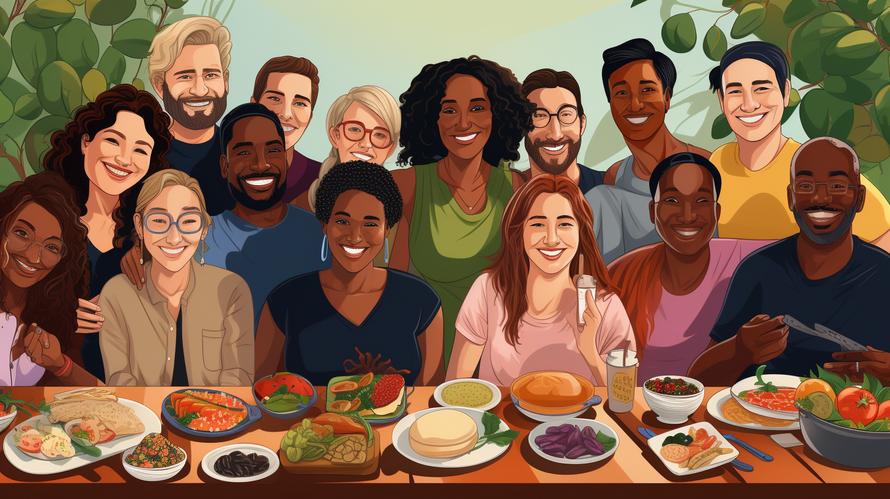When the word “cancer” is tossed around, it sends shivers down the spine. And rightfully so. It’s a major health challenge cutting lives short worldwide. But here’s the kicker: A vast majority of folks are shockingly unaware that their plates and eating habits have the power to tip the cancer scales—with obesity sneaking in as a silent trigger.
Think about it. We all know someone who’s been affected by cancer. Yet, in a startling revelation from a survey involving 279 cancer patients, researchers uncovered a gap as wide as the Grand Canyon in public knowledge on what fuels cancer’s wrath. Just peeling back the layers to this finding could lead people to make life-saving changes.
So let’s not beat around the bush. Poor diets loaded with sugar, fat, and processed foods are not just expanding waistlines. They’re offering cancer a VIP all-access pass to our bodies. It’s a truth bomb that has somehow been buried under the avalanche of health misinformation and old wives’ tales still lurking, like the debunked myth that injury or surgery can conjure up cancer.
This ignorance isn’t just an ‘oops’ moment. It’s a significant crack in our armor against this disease. Time and again, we’ve seen that knowledge is a powerful weapon. When people grasp the gravity of risks and how their choices can ward off diseases, we’ve witnessed remarkable shifts in public behavior toward healthier lifestyles. Case in point? Smoking. Once a glamorous, must-do activity, smoking rates have plummeted. Thanks to relentless campaigns, a whooping 84% of those surveyed by scientists at the University of Leicester are now wise to smoking’s role in cancer.
But alas, we need to push further. The connection between what’s on our fork and our increased cancer risk needs to be as clear as day. While it’s true that many cancers are indeed beatable if caught early, prevention will always be a thousand times better than cure. We can’t just sit back and let a cocktail of avoidable dietary choices and obesity cut lives short.
Education must scale up. Schools, doctors’ offices, media platforms—the whole nine yards need to echo this message until it’s ingrained in our collective psyche. Shifting from high-risk dietary habits to nutritious, cancer-fighting foods isn’t just a trend or a diet fad—it’s a fundamental shift towards longevity.
It’s not just about slapping warning labels on junk food or glorifying diet plans. It’s about crafting an environment that supports healthy choices, from farm to table. Imagine whole communities where fruits, veggies, and whole grains are the stars of every meal, where a stroll in the park is as routine as brushing your teeth.
But hold on, there’s a plot twist. While diet and weight control are monumental, they’re part of a broader narrative. Factors like genetic predispositions, accessibility to healthcare, and environmental influences are also at play in this complex interplay. It’s akin to assembling a massive jigsaw puzzle, where each piece fits into this intricate web of cancer causality.
I’ll lay it out straight—we must fan the flames of this conversation. Ensuring that every man, woman, and child knows the hard truths and soft lies about what brews cancer in our system. “This shows that some messages are getting through, but we clearly have more work to do in educating the public on the effect of diet and obesity,” stated researcher Paul Symonds. Truer words have never been spoken.
So, let’s grasp the torch of wisdom and lead the way. Whether it’s swapping out that sugary soda for a brisk walk, or saying “no” to that bacon double cheeseburger in favor of a quinoa salad, each choice is a step in the right direction. It’s about building a fortress around our health with bricks of knowledge and mortar of action.
Now, don’t get me wrong, enjoying an occasional indulgence isn’t a crime. Life’s too short to not savor a slice of pizza or a decadent piece of chocolate cake once in a while. But it’s the daily, consistent choices—the ones that form the backbone of our habits—that set the foundation for our health and well-being.
Bottom line? Our plates are more than a sumptuous spread of culinary delights. They’re the control panels to our health. It’s high time we recognize and harness this power lest we leave ourselves vulnerable to the whims of a completely preventable fate like diet-induced cancer.
So next time you’re about to dish out some grub, think bigger than your taste buds. Think of your body as a temple. Think of the legacy you’re leaving in every bite. Do it for yourself, do it for the generations to come, who’ll one day look back at our time and either say, “They knew, and they acted,” or “They knew, and they did nothing.” The choice—and the power—is in your hands.



